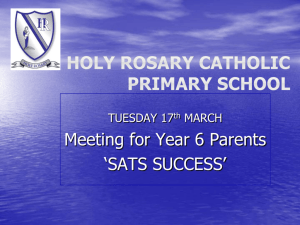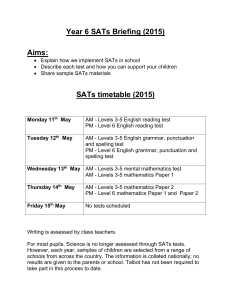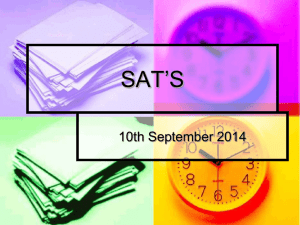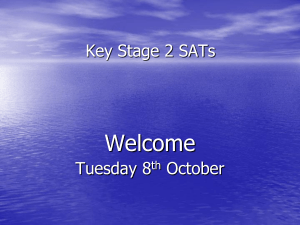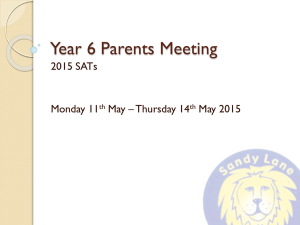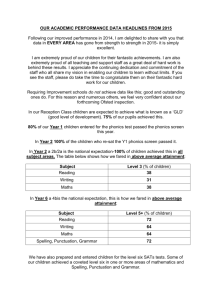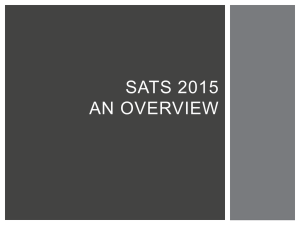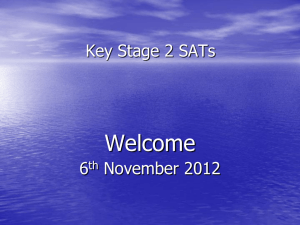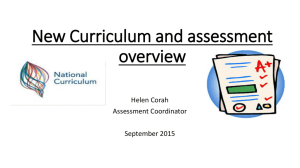welcome to the year 6 sats evening
advertisement
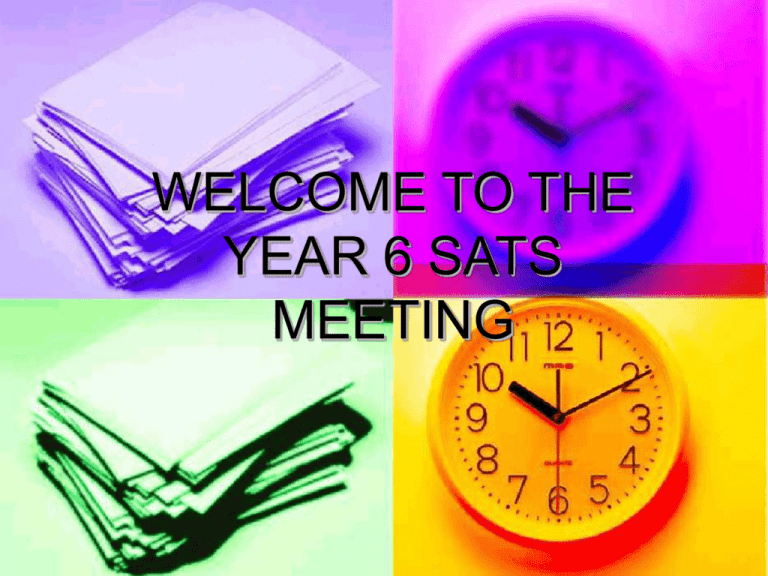
WELCOME TO THE YEAR 6 SATS MEETING Timetable for testing Level 3-5 testing is from: Monday 11th May to Thursday 14th May inclusive. (Mornings) Monday Reading Tuesday English grammar, punctuation and spelling test (SPAG) Wednesday Mental Maths & Maths Test A Thursday Maths Test B Friday Timetable for testing Level 6 testing will be the same week, however the tests will take place in the AFTERNOON. Monday English reading test Tuesday English grammar, punctuation and spelling test. Wednesday Thursday Mathematics paper 1 and paper 2 SAT’s week Please ensure your child is in school every day over the week. Please do not book appointments e.g. dentist etc If your child is ill on the day of any tests please let us know as soon as possible, there are other things we can put into place to help. Please make sure your child is in school on time. What does it mean for your child? SAT’s are a statutory test taken by all eligible year 6 pupils across the U.K. They all happen on the same date at the same time. The test marks formulate into levels which are used to “set” your child in High School along with Teacher Assessments from year 6. The levels are used throughout Great Britain within the National Curriculum, which is taught to all pupils. Levels Level 3- This band is given if your child is achieving below the national average for Year 6 pupils. Level 4- This band is where your child should be on leaving Year 6. Level 5- This band is where your child should be if they are exceeding expectations. Level 6- This band is for children that are higher-attaining pupils which allows the children to demonstrate their attainment beyond level 5 (this level will only be awarded if the children are working at a high 5/ low 6) Reading Paper The reading test is 1 paper. It lasts for 60 minutes. It has changed this year in terms of content and timings Your child will be given a reading booklet with 2/3 different texts in and then a written test which require them to provide answers to a range of comprehension questions. Each question will tell your child which parts of the text to refer to. An overall level will be given from this paper. What you can do to help: encourage your child to read a range of types of material - not just stories or novels. read something and then ask questions about it. show how the more you back up the answer from the text the more marks will be awarded. increase reading speed. There’s a lot to read in the test and it needs to be read quickly. increase ability to check the question. what is the question really asking for ? show how to quote directly from the text. Grammar, Punctuation and Spelling This year your child will sit a grammar, punctuation and spelling test- in short it is called SPAG. This is the second time that children have been asked to sit a test of this nature. Your child throughout year 6 have been working on the fundamentals of the English language English Writing Level -This year your child’s English writing level will be formulated through teacher assessment as opposed to testing. -We have been working all year with your child to write independently in a range of genres in their writing journals. -We have been assessing them since September Mathematics- Level 3/4/5 In Maths there are 2 papers a Test A and a Test B which are BOTH non-calculator papers. This has changed this year, because in the past the paper B used to include calculator based questions. Each tests lasts for 45 minutes. Mental Mathematics Mental Mathematics (CD) The final assessment in Mathematics is a mental maths test, marked out of 20. This assessment is played from a CD to the class. Your child will have certain time limits to answer these questions. Mental Mathematics The first 5 questions have a time limit of 5 seconds. The next 10 questions have a time limit of 10 seconds. The last 5 questions have a time limit of 15 seconds. Your child is encouraged to jot down the numbers to help them. What you can do to help: give practice questions with time limits for answering. help the learning of tables ... be able to do them at random, not just chanting. ask questions which turn tables around ( e.g. not 5x6 but how many 6s in 30?). phrase questions in different ways (how many pairs of gloves in 350 gloves?). make questions increasingly difficult (how many 24 seater coaches will be needed to carry 350 pupils?). demonstrate making jottings, write important info. down (e.g. write the next number in this sequence 16,32,48,…). Level 6 tests These tests will be sat by a small minority of year 6 children. They are solely for children already working consistently at a high level 5( 5a) low level 6 (6c). By now your child knows if they will be sitting any level 6 tests. Breakfast Club On the week of the SATs we will hold a free breakfast club in school, which we encourage your child to attend. This has worked well in the past as it allows children to relax with their peers before the test. It is completely free and flexible, if your child only wants to come to 1 morning they can. Results At the end of the year your child will receive a teacher assessed level and test level for: Maths Writing Reading Science and finally ... whatever happens your child will get the result which reflects where they are…..rest assured, they have all made progress and nobody could ask more from them! Thank you for attending this meeting! Any Questions!
